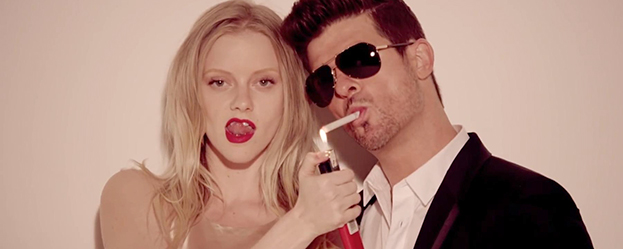This website uses cookies so that we can provide you with the best user experience possible. Cookie information is stored in your browser and performs functions such as recognising you when you return to our website and helping our team to understand which sections of the website you find most interesting and useful.
Business News Legal Top Stories
Mavin Gaye’s family submit opposition to Blurred Lines appeal
By Chris Cooke | Published on Friday 23 December 2016

Marvin Gaye’s family have responded to attempts by Robin Thicke and Pharrell Williams to overturn the high profile ruling in the ‘Blurred Lines’ song-theft case.
As much previously reported, in 2015 a court ruled that Thicke n Pharrell had ripped off Gaye’s ‘Got To Give It Up’ when writing their often controversial hit ‘Blurred Lines’. Although the initial damages sum awarded to the Gayes was cut a little by the judge, it still topped $5 million in addition to a share in ongoing royalties generated by the ‘Blurred Lines’ song copyright.
As also previously reported, in August this year 212 artists signed an amicus brief supporting Thick n Pharrell in their appeal of the ‘Blurred Lines’ ruling, with an eclectic bunch of artists – including John Oates, Linkin Park, The Go-Gos and Hans Zimmer – arguing that the judgment in the plagiarism case set a dangerous precedent.
That court submission said: “The verdict in this case threatens to punish songwriters for creating new music that is inspired by prior works. All music shares inspiration from prior musical works, especially within a particular musical genre”.
Key to Thicke n Pharrell’s appeal is a US copyright law technicality. The legal battle is over the song copyright, not the rights in the recording, and American copyright rules traditionally say that only the composition of a song as submitted with the US Copyright Office is protected by the song right.
Which means copyright does not protect those elements of the song that appear in the original recording but which were not in the original submitted composition (today the recording could be the submission, but that wasn’t always so). And crucially, Thicke n Pharrell’s side argue that, if there is any commonality between ‘Blurred Lines’ and ‘Got To Give It Up’, it’s those non-protected elements.
All of this was debated before the original ‘Blurred Lines’ court case even got properly underway, with the judge there basically agreeing with Thicke n Pharrell’s interpretation of US copyright law. As a result, the Gaye family’s lawyers were banned from playing the original recording of ‘Got To Give It Up’ in court, instead having to rely on a performance of the registered song.
But, argue Team Thicke n Pharrell, once the case was up and running the judge didn’t enforce his own interpretation of that copyright technicality very well, allowing witnesses for the Gaye family to talk about elements of ‘Got To Give It Up’ beyond the core composition. They also argue that the judge failed to properly caution the jury about considering elements of the Gaye track that were beyond the protection of the song copyright.
Those arguments were core to the appeal documents Thick n Pharrell submitted in August. And while a response submitted by the Gaye family’s lawyer yesterday covers various issues and arguments, the debate around what is and is not protected by the song copyright is a key element of that submission too.
While obviously happy with the outcome of the ‘Blurred Lines’ case, the Gaye family’s chief lawyer, Richard Busch, argues that their victory actually came despite the original judge getting it wrong on the issue of what is protected by the ‘Got To Give It Up’ copyright. He argues that the limitation approved by the judge is the result of a technicality with regards how copyrights were registered in the US until 1978, and that that technicality shouldn’t be used to limit copyright protection four decades on.
Indeed, according to Busch, it’s this element of the original case that actually sets the dangerous precedent. According to The Hollywood Reporter he writes: “The issue is of considerable importance for the many studio compositions created before 1978. If protection turns on the happenstance of a decades-old – and long since abandoned – Copyright Office practice, along with the degree of attentiveness of the transcriber, an open invitation to taking will be the consequence”.
Basically Busch is arguing that the copyright protection should apply to the song as released rather than registered, not least because many legendary pop songwriters, including Gaye, couldn’t read sheet music, so the versions logged with the Copyright Office were actually someone else’s notation. Notes the new submission: “Marvin Gaye is hardly the only Hall Of Fame artist and composer who did not read or write notation. Motown founder and music guru Berry Gordy did not read music [either]”.
It goes on: “Nor did Michael Jackson or Jimi Hendrix or Eric Clapton. The King, Elvis Presley, was yet another legend who composed before sound recordings could be deposited and did not know how to read or write musical notation. They and countless others created timeless, unique and original compositions before 1978. No doubt all would be surprised to learn that their compositions are protected only to the extent that a transcriber happened to notate elements on a lead sheet”.
So, to conclude, the Gaye family don’t think there should be an appeal hearing at all, but if there is, they will argue that the judge in the first trial did a perfectly fine job of enforcing his own copyright limitation on the case, even though he was entirely wrong to apply that limitation in the first place.
It remains to be seen how the Ninth Circuit Court Of Appeals now responds.





